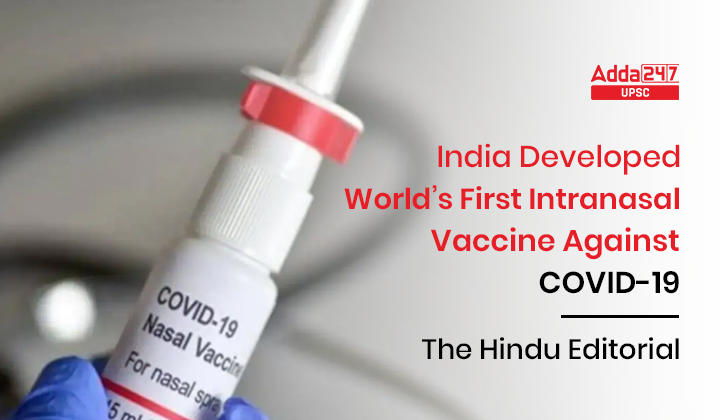Table of Contents
Relevance of Intranasal Vaccine Against COVID-19 for UPSC
iNCOVACC is the world’s first intranasal Covid vaccine to receive approval for the primary two-dose schedule and the heterologous booster dose.
Intranasal Vaccine Against COVID-19 covers:
UPSC GS Paper – 2 : Health
UPSC GS Paper – 3 : Scientific Innovations & Discoveries.
Also Read:
Har Ghar Dastak 2.0 campaign- Boosting COVID-19 Vaccination
Why Intranasal Vaccine Against COVID-19(iNCOVACC) in news?
- iNCOVACC (BBV154), an intranasal vaccine against coronavirus disease, has received approval from the Central Drugs Standard Control Organisation (CDSCO) under Restricted Use in Emergency Situation for all adults in India, for heterologous booster doses.
- iNCOVACC (BBV154) is prepared by Bharat Biotech International Limited (BBIL).
Also Read:
What will be change with CDSCO’s approval?
Early three months after Bharat Biotech’s intranasal COVID-19 vaccine was granted emergency use approval for primary vaccination of adults, the vaccine has now been given emergency use approval as a heterologous booster in adults over 18 years.
Key Details about iNCOVACC
- iNCOVACC is the world’s first intranasal Covid vaccine to receive approval for the primary 2-dose schedule and heterologous booster dose. iNCOVACC is stable at 2-8°C for easy storage and distribution.
- iNCOVACC is a recombinant replication deficient adenovirus vectored vaccine with a pre-fusion stabilized SARS-CoV-2 spike protein.
- This vaccine candidate was evaluated in phases I, II and III clinical trials with successful results.
- iNCOVACC has been specifically formulated to allow intranasal delivery through nasal drops.
- The nasal delivery system has been designed and developed to be cost-effective in low and middle-income countries.
- iNCOVACC was developed in partnership with Washington University, St Louis.
Also Read:
Anti Microbial Resistance in India: WHO Report on AMR Vaccines
Advantages of Intranasal Vaccines over Normal Vaccines
- An intranasal vaccine stimulates a broad immune response – neutralizing IgG, mucosal IgA, and T cell responses. Immune responses at the site of infection (in the nasal mucosa) – essential for blocking both infection and transmission of COVID-19.
- Unlike Covaxin, an inactivated vaccine, the intranasal vaccine uses a viral vector platform that utilises a recombinant adenovirus as a vector.
- As a heterologous booster, the intranasal vaccine was tested on around 875 participants, immunised earlier with two doses of either Covaxin or Covishield.
- Among the advantages intranasal vaccines have over vaccines is that they can potentially prevent SARS-CoV-2 infection at the point of viral entry in the respiratory tract.
- They are also far easier to administer.
Also Read:
What are the key challenges?
- As in the case of the intranasal vaccine for primary vaccination, the booster dose too was tested only for safety and immunogenicity, but not efficacy.
- Unlike the vaccines tested early in the pandemic, evaluating the efficacy of a new vaccine for primary vaccination and heterologous booster at this stage of the pandemic might be very challenging as a vast population has been already vaccinated and/or naturally infected, especially with the Omicron variant.
- However, even higher immunogenicity need not necessarily translate into higher efficacy, particularly the ability of the vaccine to prevent infection.
- The SARS-CoV-2 virus has now acquired an even greater ability to evade existing immunity and cause an infection.
- Since the intranasal vaccine does not have the virus spike protein with newer mutations, it is important to study within a defined time period the effectiveness of the intranasal vaccine to prevent infection and severe disease and death when used as the primary vaccination and as a booster dose. Alternatively, the vaccine’s effectiveness can be tested in human challenge studies.
Also Read:
PRaGeD Mission: An Initiative by CDFD
Way forward
- The demand for vaccines for primary vaccination has been reducing since the third wave peaked in end-January while those for boosters has been low even when available for free for 75 days beginning mid-July.
- Yet, the development of an intranasal vaccine, a new vaccine platform for India, is welcome, and having a safe and effective vaccine that can prevent infection remains a high priority.
Conclusion
Thus, intranasal immunization will definitely boost the fight against SARS-CoV-2, as it can create an immune response in the nose, which is the point of entry for the virus—thereby protecting against disease, infection, and transmission.
Also Read:
What is the Science behind Narco and Polygraph tests? | Know for UPSC
FAQs
Q. Which is the world’s first intranasal Covid vaccine?
iNCOVACC is the world’s first intranasal Covid vaccine.
Q. What is the science behind iNCOVACC ?
Ans. iNCOVACC is a recombinant replication deficient adenovirus vectored vaccine with a pre-fusion stabilized SARS-CoV-2 spike protein.




 TSPSC Group 1 Question Paper 2024, Downl...
TSPSC Group 1 Question Paper 2024, Downl...
 TSPSC Group 1 Answer key 2024 Out, Downl...
TSPSC Group 1 Answer key 2024 Out, Downl...
 UPSC Prelims 2024 Question Paper, Downlo...
UPSC Prelims 2024 Question Paper, Downlo...
